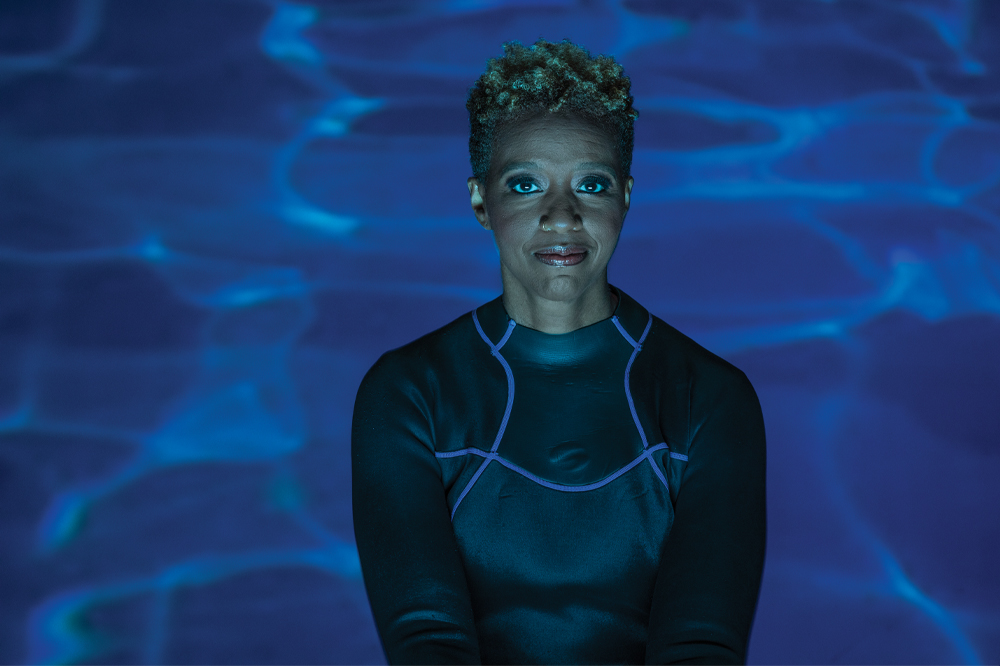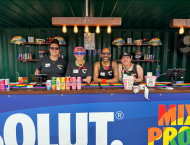Life
 Tara Roberts. Photo courtesy of National Geographic.
Tara Roberts. Photo courtesy of National Geographic.
Nat Geo Storyteller Tara Roberts Dives “Into the Depths”
February 1, 2022 @ 8:00am
Back in 2016, when the National Museum of African American History and Culture first opened, National Geographic Storyteller Tara Roberts came across a photograph of Black scuba divers on the second floor that piqued her curiosity.
“It was this huge picture of Black people in wetsuits on a boat,” Roberts recalls, noting in hindsight her imagination exaggerated the photo’s size. “They were primarily Black women who looked like superheroes to me. They were standing on this boat with their fists balled up on their hips. It was like they had capes flowing in the wind. There’s something really majestic and amazing to me about that photograph.”
When something sparks Roberts’ interest, she dives all in.
“I was like, ‘Who are these people?’” Roberts recalls. “Then I went to look at the words around the picture, which said they were part of this group called Diving with a Purpose that dove for slave shipwrecks around the world. And I was like, ‘That’s the most amazing thing I’ve ever heard in my entire life.’”
In her initial research, she learned an estimated 1,000 slave ships wrecked during the Transatlantic slave trade. Of that estimate, less than 10 have been found. Roberts reached out to the founder of Diving with a Purpose, Ken Stewart, to see if the nonprofit she worked for at the time could help fund their efforts. While the grant did not work out, the connection was made — and Roberts’ dedication to their mission was solidified.
As someone who already loved to swim, she began to take diving classes in D.C., eventually quit her job and applied and got a grant with National Geographic to cover the stories of the sunken slave ships and the divers working to uncover them globally. Now, Roberts is sharing her reporting through a six-episode podcast series “Into the Depths,” which launched January 27.
We caught up with Roberts to get a behind-the-scenes look at the making of the podcast, the importance of uncovering slave shipwrecks and why it matters that Black divers, historians and archeologists are leading the mission to uncover this part of history.
District Fray: What insights did you gain from your travels and reporting?
Tara Roberts: When I started, I did not know that 1.8 million Africans died in The Middle Passage. Not five people, not 10 people, not 1000 people. 1.8 million Africans died and there’s nothing honoring them. It’s just a footnote in some history books — and it’s not in most. That to me is a tragedy. There’s a whole bit of history that has not been explored, examined and shared. It’s an embarrassment for what’s taught in U.S. history that I didn’t learn East Africa was a part of the slave trade. I thought it was only West Africa. But learning of the found ship in Mozambique, which went around the horn of South Africa and then on to the Americas, creates all kinds of questions of ancestry and connections.
Where did your reporting take you?
Mozambique, South Africa, Senegal, Benin, Togo, Costa Rica, Saint Croix, and then to Florida and Alabama. It’s all places where work was happening, to either find or document a ship.
Why is it important to focus on other aspects beyond the diver’s stories?
One of the reasons the ships themselves are important in the story is that there’s something about having the material evidence which can’t be denied. And that’s what has happened so often. Inside of these kinds of stories, it’s easy to say, ‘No, no, no, it didn’t happen. That’s wrong. That’s a lie’ But when you have the evidence, it changes things.
How did you organize the podcast since there are so many facets to this story?
It was hard [laughs]. The podcast is structured around three elements. One is the ships, so there’s a ship in each episode. It’s also the divers, so understanding their work and their connection to this history. And then there’s my arc and story of how I changed as a result of embarking on this journey.
How so? How did you change?
I didn’t realize I had a wound inside of myself around my avoidance of history until I was forced to face it on this journey. It’s Black folks’ pain and trauma. Looking back at history was traumatizing to me and embarking on this journey gave me another way to intersect with the past that wasn’t traumatizing — it was strength-building. It finally made me curious in a way I’d never been about whether I could trace my own roots back to a slave ship. I ended up hiring a genealogist to see how far back I could go, which empowered me to embrace my own story and find pride.
Who is your audience?
Anyone with an interest in history. The global slave trade is an event in history that involves four major continents. Economics from the slave trade created modern-day economics. It’s the way we have built wealth in this country. The reason America is a “leader” in the world is because of the wealth that was built in.
What would you like people to take away from the podcast?
There’s this huge myth Black people don’t swim and Black people are afraid of water. We go into deep detail about this in episode four. Black folks have a long aquatic history that has been erased from time. Way back in the 14th and 15th centuries, West Africans were free diving. They were being called on by other countries to help salvage ships that sunk. We’ve been sold this incorrect bill of sales making us think that’s not our heritage. We belong in the ocean. Our past is hidden on the bottom of the ocean floor. The water is a part of our legacy. This body of water sustains us as a planet and that is under threat right now. Having more Black and brown folks who care about the ocean is something I hope comes from this podcast.
Rapid-Fire Round
Favorite podcast
I’m a big fan of Sam Sander’s “It’s Been a Minute;” I also love Krista Tippett’s “On Being,” “Hidden Brain” and my friend Lydia’s “SpaceTimeMusic.”
Must-stop place for when you visit D.C.
Calabash Tea & Tonic — love that place.
Best traveling tip
Put it all in one carry-on bag. Makes life so much easier.
Best personal find when diving
I didn’t find this, but I saw a yellow snake burrowing in the sand in Mexico and it totally freaked me out; and a giant turtle that was as big as me in Thailand.
Coffee or tea?
Definitely tea — especially rooibos and chai.
Favorite time to dive
Night! It’s actually spooky and a little scary then, but I dig it.
Advice for first-time divers
Relax and remember to breathe.
Listen to “Into the Depths” on all major streaming platforms. Learn more about Tara Roberts by visiting her website here or following her on Instagram at @curvypathtara.
Learn more about other National Geographic Explorers here.
Enjoy this piece? Consider becoming a member for access to our premium digital content. Support local journalism and start your membership today.







